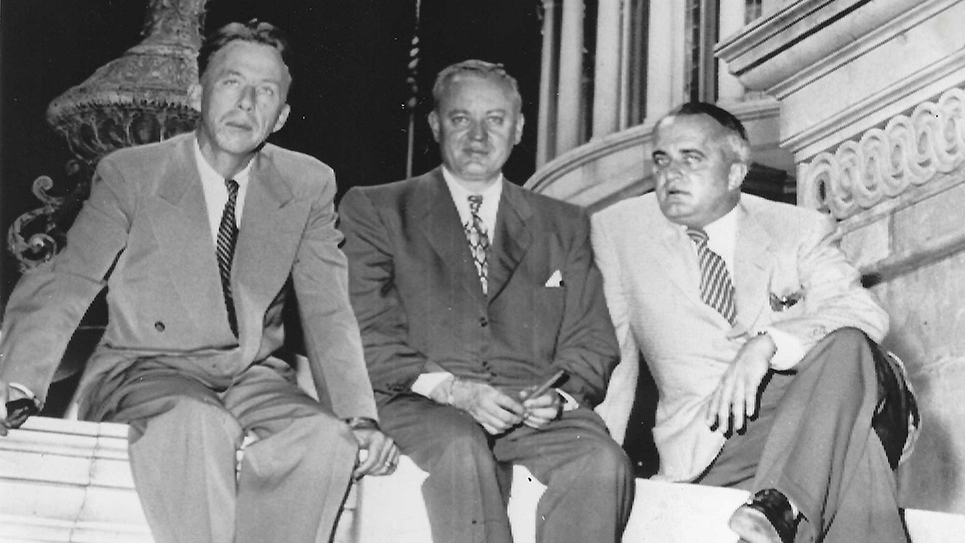Tennessee was represented by ten men in the U. S. House of Representatives and two in the United States Senate in 1945. This column will provide mini-biographies of Tennessee’s Congressional delegation at that time.
Kenneth D. McKellar was Tennessee’s senior United States senator and the longest serving member of the delegation, having first been elected to Congress in 1911. Arthur T. “Tom” Stewart was the junior senator and had originally been elected in 1938.
B. Carroll Reece, a Republican, was the Congressman from the First District, which comprises upper East Tennessee. Reece had returned from World War I as a genuine hero and in 1920 challenged an incumbent in the Republican primary. Reece won by a narrow margin and remained in Congress until 1930 when he was upset by Oscar B. Lovette, who ran as an Independent. Congressman Reece had barely survived a primary challenge from Sam Price that same year and Reece lost the general election, as there were a goodly number of Republicans who were unhappy with his antagonistic attitude about the development of the Tennessee Valley Authority.
Carroll Reece spent the next two years mending fences, anticipating the time he could run against Congressman Lovette in the 1932 Republican primary. Reece campaigned hard and won the Republican nomination in a close race; Lovette ran in the general election again as an Independent, but was unsuccessful.
Congressman Reece’s victory over O. B. Lovette helped him to establish and solidify his dominance in a very Republican district. Carroll Reece would continue to exercise his hold over upper East Tennessee until his death. Reece voluntarily retired from Congress in 1947, as he had been elected Chairman of the Republican National Committee. Carroll Reece presided over the 1946 elections and the GOP won both houses of Congress. Reece intended to devote all his energies to his post as GOP Chairman and by 1948 he perceived an opportunity for a Republican to be elected to statewide office in Tennessee. The Democratic Party was fractured by a divisive primary for the Senate; incumbent Tom Stewart had lost to Congressman Estes Kefauver while E. H. Crump, leader of the Shelby County political organization, supported a third candidate, Cookeville Judge John A. Mitchell. Mitchell’s candidacy siphoned off enough votes from Senator Stewart to enable Estes Kefauver to win. Mr. Crump was also refusing to support President Harry Truman’s election bid, preferring to back the insurgency candidacy of Strom Thurmond and the “Dixiecrat” Party.
Reece and Roy Acuff thought they could take advantage of Democratic infighting to win. While the popular Acuff drew enormous crowds, Tennesseans apparently liked his music, but not enough to vote for him. Both Reece and Acuff lost.
With statewide office foreclosed to him, Carroll Reece ran to reclaim his old seat in Congress, challenging the man who succeeded him in 1946, Dayton Phillips. It was a very close election and Reece lost his own home county to Congressman Phillips, but he managed to prevail by a small margin. Reece was to remain First District Congressman and Republican National Committeeman until his death from lung cancer in 1961.
John Jennings, Jr. had represented Tennessee’s Second Congressional District since 1939 when J. Will Taylor, popularly known as “Hillbilly Bill”, had died suddenly. Jennings had been nominated to run in a special 1939 election after a wild GOP convention. Jennings won the nomination and general election and went to Washington, where he stayed for the next twelve years.
Congressman Jennings never proved to be overwhelmingly popular inside the Second District and as time passed, he drew increased opposition to his renomination inside the Republican primary. Finally, Judge Jennings faced the most serious threat of all in the person of Howard H. Baker, Sr., father of Tennessee’s first popularly elected Republican U. S. Senator. Baker, Sr. ran against John Jennings in the 1950 GOP primary and won a decisive victory. Baker’s win was such that he was never seriously challenged throughout his tenure in Congress. Howard Baker enjoyed the kind of popularity in his district that had always eluded John Jennings. Baker would remain in office until his own unexpected death in 1963.
Estes Kefauver would become one of the most famous Tennesseans of his time. After having served briefly as Commissioner of Finance in Governor Prentice Cooper’s Cabinet in 1939, Kefauver resigned to return to Chattanooga to compete for the Democratic nomination for Congress when incumbent Sam D. McReynolds succumbed to a heart attack. Kefauver, while a very poor public speaker, was a master at the art of retail campaigning, especially one-on-one and in small groups. Kefauver, an extremely ambitious man, thought of running for the U. S. Senate in 1946 against Senator K. D. McKellar but quickly concluded he could not win and ran for Congress once again. Kefauver did run for the Senate in 1948 and won a three-way race against Senator Tom Stewart.
Something of a loner in politics, Kefauver was loathed by his senior colleague Kenneth McKellar. Senator McKellar had once written his friend and political partner Edward Hull Crump that Kefauver had claimed Thomas Jefferson (a Virginian) as a Tennessee president and concluded, “He is about as stupid as they make them”.
McKellar was hardly the only Democrat who hated Kefauver; Senate Majority Leader Scott Lucas of Illinois lost his seat in 1950, largely due to revelations of corruption inside Cook County (Chicago). Senator Kefauver and his famous investigating committee had held televised hearings in Illinois while Lucas was running again and while Senator Lucas was not tied to the corruption in Chicago, he was on the same ticket with a fellow the press derisively referred to as “the world’s richest cop”.
Kefauver’s refusal to hold the hearings after the November elections did not further endear him to President Harry Truman or other Democrats in the United States Senate. When the extraordinarily ambitious Kefauver entered the New Hampshire presidential primary against Truman himself, the president’s dislike of Senator Kefauver went through the roof. Truman instigated the candidacy of Illinois Governor Adlai Stevenson, who won the Democratic nomination over Kefauver.
Estes Kefauver sought the presidential nomination yet again in 1956, only to lose to Stevenson once again. When Stevenson threw open the choice of the vice presidential nominee to the convention delegates, Kefauver fought desperately for the nomination, although he faced competition even inside his own Tennessee delegation from Governor Frank Clement and Senator Albert Gore. Kefauver finally won, defeating a young senator from Massachusetts, John F. Kennedy.
Kefauver was humiliated when his presence on the Democratic ticket did not keep Tennessee from voting for Republicans Dwight D. Eisenhower and Richard Nixon. Kefauver faced a serious challenge in the 1960 Democratic primary from Judge Andrew “Tip” Taylor, who had the strong support of the more conservative Democrats in Tennessee. Kefauver survived, but his career was cut short by his death in 1963. Kefauver died in the hospital as he had postponed surgery to await the arrival of his wife, Nancy. Just as Mrs. Kefauver’s plane was landing, Estes Kefauver’s aorta burst and he died.
Albert Gore served as a Congressman and Senator from Tennessee for more than thirty years. Gore had helped to manage Congressman Gordon Browning’s 1934 campaign for the U. S. Senate. Gore again strongly supported Browning when the latter ran for governor in 1936 and Gore was rewarded with an appointment as Commissioner of Labor. Gore left Browning’s Cabinet to seek election to Congress from the Fourth District when incumbent Congressman J. Ridley Mitchell made a quixotic bid for the United States Senate. Gore won a hotly contested primary, playing checkers at country stores and whipping out his fiddle whenever he could gather an audience.
Gore remained in Congress until 1952 when he defeated Senator K. D. McKellar. McKellar had been urged to retire by E. H. Crump and several other political associates and friends. McKellar was eighty-three years old and in failing health, but he stubbornly insisted upon running for a seventh term, which was unprecedented at the time. Albert Gore, realizing McKellar was still highly respected by many thousands of Tennesseans, never mentioned the old senator, save in the past tense. Gore campaigned at a feverish pace, while Senator McKellar’s own appearances were carefully staged and choreographed. McKellar’s physical disabilities limited his ability to campaign effectively, while the forty-four year old Gore crisscrossed the state.Despite McKellar’s enormous influence in Washington, Gore’s relative youthful and vigor proved to be a sharp contrast to the ailing senator. Gore won a smashing victory in the Democratic primary.
Gore won reelection in 1958 over a determined challenge by former Governor Prentice Cooper. By 1964, Tennessee Republicans were on the rise. Gore faced Memphis businessman Dan Kuykendall who garnered 46% of the vote. Gore’s populism and maverick streak was causing him political problems by 1970. Senator Gore only narrowly turned back a challenge from Hudley Crockett, a former spokesman for Governor Buford Ellington. Gore, known as “the old gray fox” of Tennessee politics, lost the general election to Chattanooga Republican Congressman William E. “Bill” Brock.
The former senator lived to see his son, Albert Gore, Jr., rise to the pinnacles of American politics, a feat he himself had never been able to accomplish.







